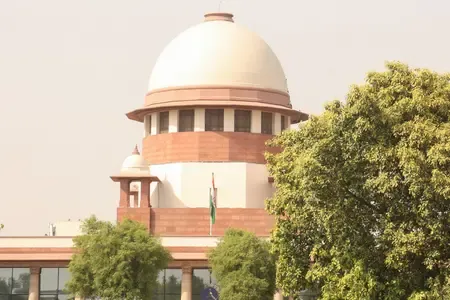What Guidelines Did the SC Establish on Summoning Lawyers by Investigating Agencies?

Synopsis
Key Takeaways
- Supreme Court imposes strict guidelines on summoning lawyers.
- Only narrow exceptions allow lawyers to be summoned.
- Summons must be approved by a senior officer.
- Clear justification is required in summons.
- Protection of lawyer-client privilege is emphasized.
New Delhi, Oct 31 (NationPress) The Supreme Court on Friday established strict guidelines to limit the ability of investigating agencies to summon lawyers representing accused individuals, indicating that such actions might violate the fundamental rights of the accused and contravene legal provisions safeguarding lawyer-client privilege.
A bench led by Chief Justice of India (CJI) B.R. Gavai, along with Justices K. Vinod Chandran and N.V. Anjaria, delivered its ruling in the suo motu case titled “In Re: Summoning Advocates Who Give Legal Opinion or Represent Parties During Investigation of Cases and Related Issues.” The court mandated that investigating officers refrain from issuing summons to lawyers defending the accused except under very limited circumstances specified in Section 132 of the Bharatiya Sakshya Adhiniyam (BSA), 2023.
The CJI Gavai panel further instructed that any summons issued must receive approval from an officer of at least the rank of Superintendent of Police (SP).
For the sake of judicial review, the Supreme Court emphasized that the summons should clearly outline the facts and circumstances upon which the investigating agency relies.
The CJI Gavai-led panel clarified that a summons for counsel can only be issued if the case fits within the exceptions listed in Section 132 of the BSA, 2023, and the invoked exceptions must be clearly mentioned in the summons.
The suo motu proceedings were initiated in response to concerns regarding the practice of investigating agencies summoning lawyers for legal opinions or representation in judicial matters.
During the proceedings, the apex court noted that such actions could undermine the independence of the legal profession and compromise the legally protected attorney-client privilege.
Both the Attorney General of India, R. Venkataramani, and Solicitor General Tushar Mehta concurred that lawyers should not be summoned solely for providing legal advice.
However, Solicitor General Mehta indicated that exceptional cases—where a lawyer is accused of being involved in illegal activities—might be treated differently, pending judicial oversight.
A previous two-judge bench, comprising Justices K.V. Viswanathan and N.K. Singh, emphasized the necessity for comprehensive guidelines, pointing out that summoning advocates in such scenarios not only infringes on their professional rights but also poses a significant threat to the autonomy of the Bar.
The Supreme Court Advocates-on-Record Association (SCAORA) also called on the apex court to protect the integrity of the lawyer-client relationship and to establish clear directives to prevent the misuse of investigative authority against legal professionals.










